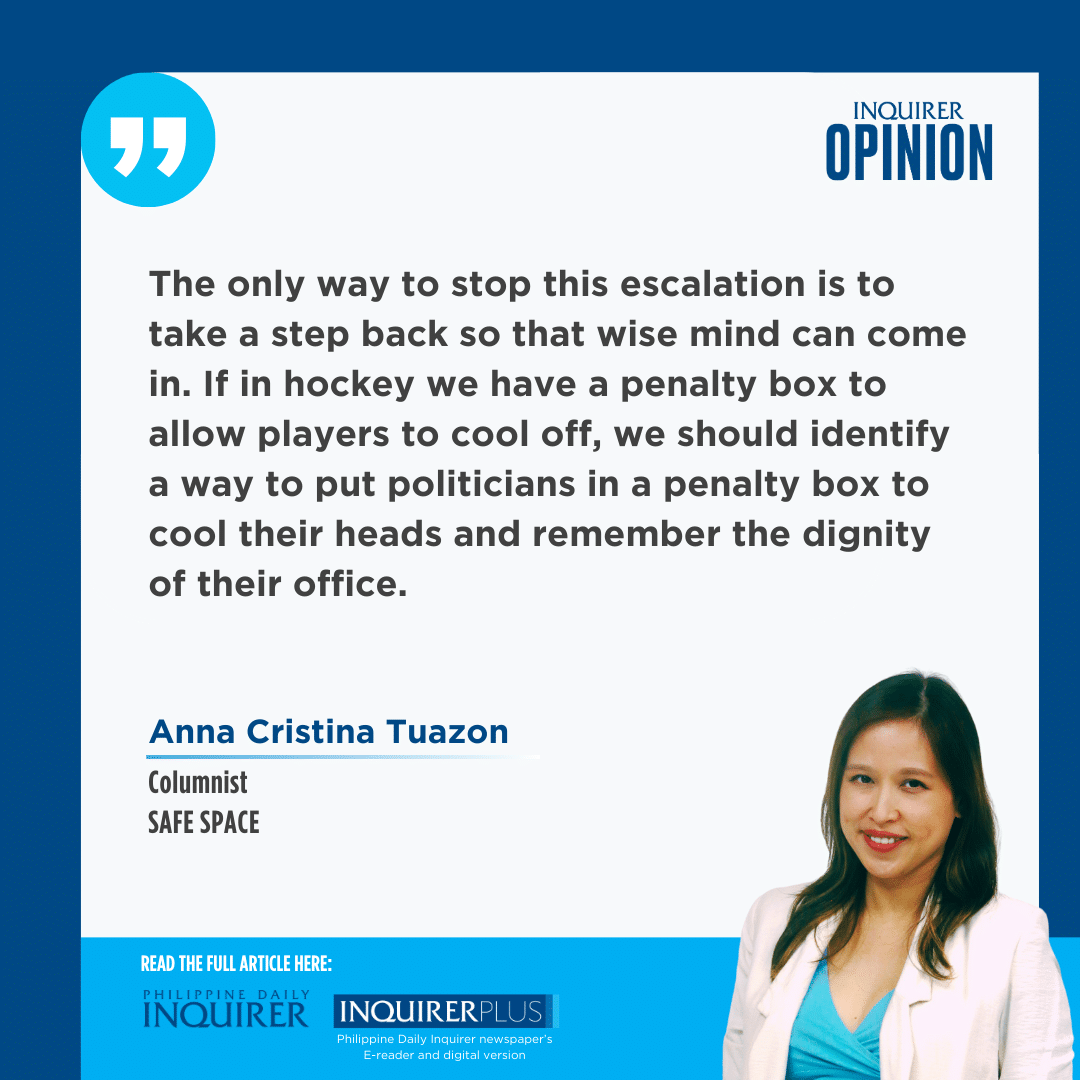Emotions taking over politics
Who needs teleseryes when politics gives us our fill of scandal and intrigue? The showdown between the Dutertes and the Marcos-led administration continues to escalate, with Vice President Sara Duterte disclosing that she had told someone to kill the President, the First Lady, and the Speaker of the House if she ever gets killed. Her father, former president Rodrigo Duterte, publicly insisted that the military is the only one that can correct President Marcos’ “fractured” governance, seemingly encouraging a coup, that would then allow her daughter to become president. Both actions of the father and daughter seem immediately illegal—grave threats and inciting rebellion—and yet they seem confident that their words are not “actionable.” The National Bureau of Investigation, Department of Justice, and even the Supreme Court are making their own investigations and deliberations, as they should. The political drama has gotten so wild that even K-drama news sites have reported on us, deeming it worth of a K-drama plot.
How did we end up here?
In dialectical behavior therapy, we consider three minds: emotion mind, reason mind, and wise mind. Each has an important role to play and disrupting their balance can lead to ineffective behaviors. Emotion mind and reason mind are dialectical poles, the first focused on our internal states and the second on what the external environment dictates of us. Only by listening to both minds can we arrive at wise mind. Smart comes from reason; wise comes from both reason and emotion. When it comes to leadership, we often see the word “wise” affixed as an ideal descriptor. This is because wise leaders not only base their decision on logic and reason but also consider the feelings and sentiments of their people. Pure emotion mind, however, is dangerous in a leader as it can lead to reckless and impulsive actions based on the ebbs and flows of their personal mood.
The Vice President’s escalating antics in the last few weeks is an example of what happens when emotion mind takes over. Her reaction to the loss of power and clout in government, via scrutiny over her use of funds and the loss of blanket support she used to receive from the Marcoses and their allies, seems to fuel her strategies. “Wala kaming kakampi,” she repeated in the congressional hearing, as an explanation as to why she keeps interrupting and not following parliamentary procedures.
I say that emotion mind has taken the reins because she is failing to see that her actions only serve to make things worse for her, a sign that reason mind is no longer in play. The more extreme her actions, the less likely that her allies can continue to support her publicly. The more she engages in threats and refuses to conduct herself professionally, the more she is seen as unstable and unfit to serve the functions of her office. The more she fears impeachment and loss of power, the more she reacts from an emotional place leading to threats and violent fantasies, the easier she makes it for others to impeach her. When someone is making the problem worse for themselves, it’s a good bet that wise mind is nowhere to be found. At this rate, her political opponents no longer need to do anything; she will secure her political destruction for herself.
In a way, I echo Senate President Francis ”Chiz” Escudero’s statement imploring her friends and allies to help the Vice President by advising her to keep calm. The challenge, however, is that emotion cannot be simply reasoned with. When emotions are out of control, everything looks like a threat. Any advice to stop or to cooperate seems like surrender. The only way to stop this escalation is to take a step back so that wise mind can come in. If in hockey, we have a penalty box to allow players to cool off, we should identify a way to put politicians in a penalty box to cool their heads and remember the dignity of their office.
Being scrutinized and being made accountable for their actions seem like unfamiliar territory for the Dutertes who are used to getting their way. They are used to making death threats with impunity to the point that they have forgotten that it is still a crime in this country. Whereas before, their budgets were approved without any deliberation (as then supported by Marcos allies in Congress), the VP seems incredulous at the idea that she now has to rationalize her budget and that she couldn’t just take the funds and give it to whoever she wants.
A big part of emotion dysregulation is difficulty with distress tolerance. Since they are not used to such challenges in their political career, they have not developed the political stamina to handle the process of check-and-balance in government. In this, Davao City has spoiled them. Filipinos continued enabling their behaviors and reckless beliefs about accountability during the Duterte presidency, where check-and-balance was also nonexistent.
Emotions give us information to help us make decisions, but we should not let emotions control our behavior, especially in politics.
—————-
aatuazon@up.edu.ph





















